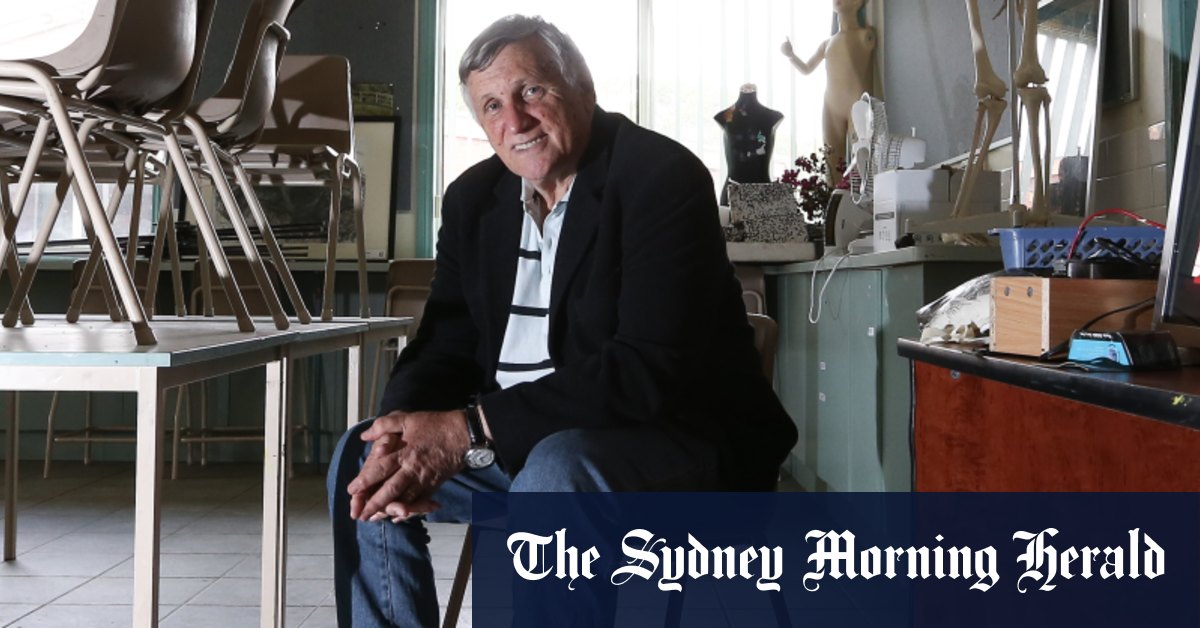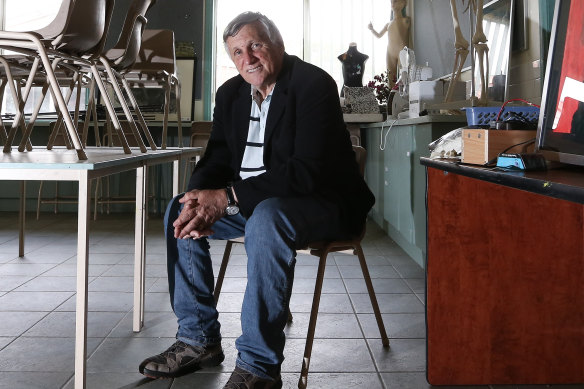
John Marsden was and is the S.E. Hinton of Australian literature – we should probably start there. Just as whole generations worldwide recall devouring Hinton’s The Outsiders, so do at least a few generations of Australians recall their relationship with Tomorrow When the War Began – all seven books of the series. Not to mention everything else John Marsden created.
I first came across John’s books at a railway station near the education campus of UNSW in Oatley when I was 20. A girl I knew from the course was raving about the Tomorrow series, and I was 110 per cent sceptical. Who did this guy think he was? Some middle-aged man writing so authentically about teenagers? How was such a thing possible?

John Marsden in the art room of his arts-based secondary school, the Alice Miller School in Macedon, Victoria. He inspired generations of readers, and writers.Credit: Alex Ellinghausen
Inch by inch, though, John Marsden infiltrated my consciousness. I was desperate to become a writer, and at that age, all you indignantly see is people you consider not that great getting it done, soaking up their own success. And John Marsden was the obvious king.
I remember the first book of his I ever read. As a casual high school teacher, I was assigned a two-week block, and my year 9 class was reading Letters from the Inside. Or more accurately, they were eating it up. It was then that I fully understood what John Marsden was able to do. His superpower was that he wrote, thought, felt, spoke and inhabited life as a teenager. It hit me incredibly hard: This bastard’s the real deal.
In writing, he was like that person who could give a speech to thousands of people, but you felt like he was talking just to you.
It’s tempting at times like these for us contemporaries to climb from the woodwork, to claim how well we knew him – but I didn’t really know John Marsden at all. He was more just an incredible presence.
I recall at a conference once, in a dim-lit corridor before a session, a voice called out to me, “Hi, Markus.” IT WAS JOHN FREAKING MARSDEN! I’d just published my third book to not much success, and here was John saying hi, and it meant a lot to me. It also showed his character, and that what mattered to him most was not the highs of so-called success, but the ambition and craft of the work. He was recognising me on that level, and it’s something I’ll never forget.

Author and former teacher Markus Zusak.Credit: Tim Bauer
There are thousands of stories out there about John Marsden the man. Among writers for young people, he’s both a legend and an urban legend. He wrote non-stop. He skirted controversy. There were books that might see him demonised, or harm his popularity, but he went and wrote them anyway. At talks he was giving, there would often be a whisper that he was wearing a shirt he’d just bought on the way because he’d only remembered he was doing it 45 minutes beforehand.
To me, he’s also a Joyce Carol Oates or even a Dylan-like character – he always seemed to be working, as if writing were as essential to his existence as breathing. He collaborated brilliantly with some of the greats: Shaun Tan and Sally Rippin, just to name a few. Then the countless writers he mentored, or influenced. Again, the great Alice Pung and Scot Gardner aren’t a bad place to start.
Loading
He was also the guy who could make everyone take a stand. Whenever someone says to me about their book, “Oh, it’s just a young adult novel,” I’m able to say, “You can take the just out of that sentence.” After all, one of our country’s most successful and prolific writers was exactly that – a YA novelist.
Lastly, beyond the books, there was the teaching, the workshops for up-and-coming writers, and eventually founding his own school. He’s doing what? I recall thinking, but of course, it didn’t surprise me. One thing clear to everyone was that if John Marsden was passionate about something, he would do it no matter the cost.
Loading
The question of what John leaves behind is almost beyond asking. There’s a mass of books and ideas. There are whole tribes of memorable characters, from the team players and heroes to the upstarts and the loners. But as a writer who came after him, there are two things that distinguish him most, at least for me.
First, the unshakable John Marsden voice. Every writer will tell you that finding your voice is the hardest thing to get and the easiest thing to lose – and John Marsden had it always. In writing, he was like that person who could give a speech to thousands of people, but you felt like he was talking just to you.
That, and of course, he leaves behind an army of readers who adore him – young people who fell in love with books thanks to him and his life’s purpose. Make no mistake, we lost a giant of Australian writing last week, but such is his body of work, we didn’t lose him, not really.
Markus Zusak’s latest book Three Wild Dogs (and the Truth) is out now.



